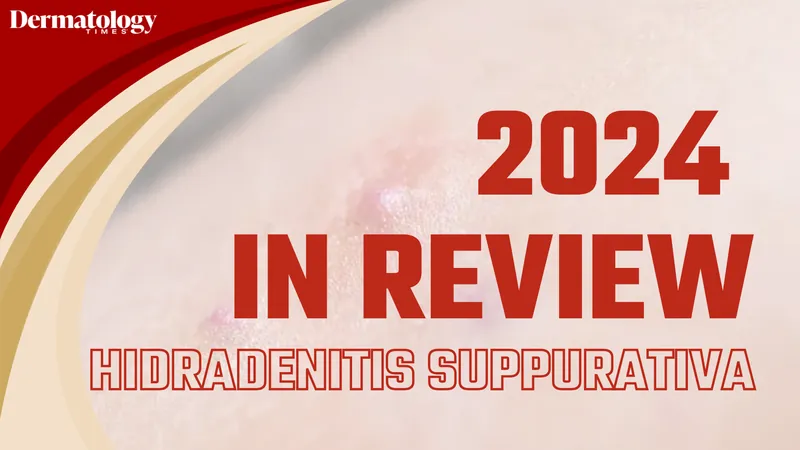
2024 Update on Hidradenitis Suppurativa: Key Findings and Developments
2024-12-28
Author: Rajesh
As we turn the page into 2024, significant strides have been made in the understanding and treatment of Hidradenitis Suppurativa (HS), a chronic skin condition that can cause painful lumps under the skin. Here’s a recap of critical studies and findings from the past year.
Oral Orismilast Shows Promise in HS Treatment
A recent Phase 2a study revealed that oral orismilast presents a favorable dose-dependent tolerability profile among HS patients. Investigators noted that these results could indicate the drug's potential for facilitating meaningful clinical improvements, potentially changing the landscape of HS management.
Lutikizumab Advances to Phase 3 Trials
Positive outcomes from a Phase 2 trial indicated that lutikizumab is effective in treating HS, with higher response rates observed in participating patients. Given these results, the treatment has moved forward into Phase 3 clinical trials, raising hopes for broader options on the treatment horizon.
Market Shifts: Secukinumab as a Leading HS Therapy
A market study conducted by Spherix Global Insights highlighted the emergence of secukinumab as a leading treatment for HS among more than 100 U.S. dermatologists. The approval of this therapy has significantly impacted the ongoing treatment landscape, with healthcare providers optimistic about its efficacy.
Exploring the Role of Intravenous Ertapenem Therapy
Research into intravenous (IV) ertapenem therapy suggests that while new immunomodulator therapies are being developed, IV antibiotics can serve as an effective complement in managing HS, especially for patients experiencing severe symptoms.
Understanding the Hippo Pathway and Fibrosis
A study conducted by researchers from the University of Michigan and Almirall explored how the Hippo pathway might be regulated to alter the profibrotic fibroblast response in HS. This discovery could provide valuable insights into new therapeutic strategies targeting fibrosis in HS patients.
Dietary Considerations in HS Treatment Remain Unclear
A review on the relationship between diet and HS has highlighted inconclusive findings regarding dietary elements, such as vitamin D and B12 supplementation, and their impact on HS severity. More research is warranted in this area to establish clearer dietary guidelines for patients.
Surgical Options and Clinical Pearls Discussed at AAD
At the recent American Academy of Dermatology (AAD) Annual Meeting, Dr. Ashley Nicole Elsensohn shared insights on improving excision care for HS patients. Additionally, presentations covered various surgical procedures that can be effectively performed in-office for managing HS.
Anticipated FDA Approvals for Bimekizumab
The upcoming FDA approval of bimekizumab has generated excitement, as Phase 3 studies (BE HEARD I and BE HEARD II) showcased significant improvements in skin pain over 48 weeks. If approved, this will mark the first IL-17A and IL-17F inhibitor authorized in Europe specifically for HS treatment.
Hormone Therapy Effects in Transgender Patients Unveiled
Research findings suggest that transgender patients taking testosterone for gender-affirming hormone therapy may experience a worsening of HS symptoms, which emphasizes the need for careful monitoring and tailored treatment plans in this population.
Innovative Collaborations in HS Research
Companies like Incyte and MoonLake are actively pursuing new treatments for HS. Collaborations and partnerships aim to enhance research efficacy, with groundbreaking studies evaluating therapies like povorcitinib and sonelokimab for HS and other inflammatory skin conditions.
Technology in Patient Support: AI Chatbots on the Rise
Exciting developments in patient support have emerged, as studies assess the use of AI chatbots providing reliable and accurate information to individuals with HS. This highlights the growing intersection of technology and healthcare in empowering patients.
As we continue to navigate the challenges associated with Hidradenitis Suppurativa, these recent developments provide hope for improved management options for patients suffering from this condition. With ongoing research and innovative treatments on the horizon, the dermatology community is eager to address and alleviate the suffering caused by HS effectively. Stay tuned for more advancements in 2024!



 Brasil (PT)
Brasil (PT)
 Canada (EN)
Canada (EN)
 Chile (ES)
Chile (ES)
 España (ES)
España (ES)
 France (FR)
France (FR)
 Hong Kong (EN)
Hong Kong (EN)
 Italia (IT)
Italia (IT)
 日本 (JA)
日本 (JA)
 Magyarország (HU)
Magyarország (HU)
 Norge (NO)
Norge (NO)
 Polska (PL)
Polska (PL)
 Schweiz (DE)
Schweiz (DE)
 Singapore (EN)
Singapore (EN)
 Sverige (SV)
Sverige (SV)
 Suomi (FI)
Suomi (FI)
 Türkiye (TR)
Türkiye (TR)